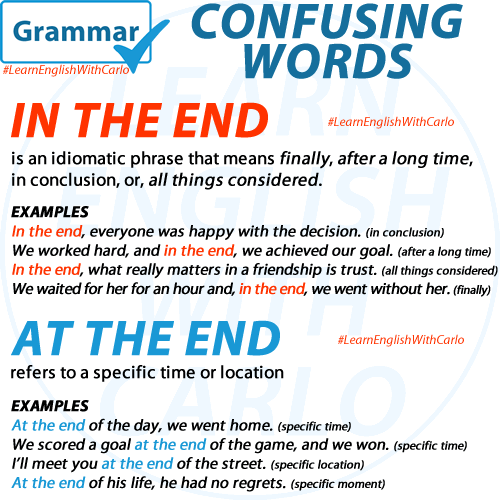
GRAMMAR – AT THE END vs IN THE END
English learners often confuse the phrases at the end and in the end because they sound similar. However, their meanings and usage are distinct. Let’s break them down and look at some examples to help you use these phrases correctly.
What Does AT THE END Mean?
At the end refers to a specific time, place, or point. You use it when you’re talking about something that happens at the conclusion of a particular event, period, or location.
Common Structures:
- At the end of + noun (e.g., at the end of the day)
- At the end + location (e.g., at the end of the road)
Examples of AT THE END:
- At the end of the day, we went home.
(Specific time: the conclusion of the day.) - We scored a goal at the end of the game, and we won.
(Specific time: the final moments of the game.) - I’m going on holiday at the end of the week.
(Specific time: the last part of the week.) - At the end of his life, he had no regrets.
(Specific point: the conclusion of his life.) - The shop is at the end of the street.
(Specific place: the farthest point of the street.)
What Does IN THE END Mean?
In the end is an idiomatic expression that means finally, after a long time, or after considering everything. It’s often used to summarize the outcome of a situation or to explain what happened after some effort, waiting, or deliberation.
Common Uses:
- To indicate a conclusion after a process.
- To show that something happened despite earlier uncertainty or effort.
Examples of IN THE END:
- In the end, everyone was happy with the decision.
(Finally: after discussions, a positive result.) - We worked hard, and in the end, we achieved our goal.
(After a long time: persistence led to success.) - In the end, what really matters in a friendship is trust.
(All things considered: trust is the most important aspect.) - We waited for her for over an hour, and in the end, we went without her.
(Finally: after waiting a long time, they left.) - He was reluctant to try sushi at first, but in the end, he loved it.
(Finally: despite initial hesitation, he enjoyed it.)
How to Remember the Difference
Here’s a simple way to keep them straight:
- Use at the end when you’re talking about specific points in time or space.
- Use in the end when you’re talking about conclusions, results, or final outcomes.
Quick Tip:
If you can replace the phrase with “finally”, use in the end. If not, you likely need at the end.
